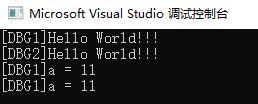【C/C++】#、##、__VA_ARGS__和##__VA_ARGS__的使用
1.如何使用#
#: 经常在宏定义里面会使用到,主要是用来把参数转换成字符串。
#的Demo 1:
#include #的Demo 2:
#include 2.如何使用##
##:是一种运算符,是将两个运算对象连接在一起,只能出现在带参宏定义的替换文本中。
NOTE:
在单一的宏定义中,最多可以出现一次“#”或“##”预处理操作符。如果没有指定与“#”或“##”预处理操作符相关的计算次序,则会产生问题。为避免该问题,在单一的宏定义中只能使用其中一种操作符(即,一份“#”或一个“##”,或都不用)。除非非常有必要,否则尽量不要使用“#”和“##”。
##的Demo 1:
#include 3.如何使用__VA_ARGS__和##VA_ARGS
__VA_ARGS__的作用是:可变参数宏(variadic macros)。用于宏定义中参数列表的最后一个参数为省略号,一般多用在调试信息。
#define DEBUG1(format, ...) printf(format, __VA_ARGS__)//该宏定义GCC下报错,MSVC下未报错
#define DEBUG2(format, ...) printf(format, ## __VA_ARGS__)//该宏定义GCC、MSVC下均未报错
在MSVC下__VA_ARGS__的Demo:
#include ##__VA_ARGS__ 宏前面加上##的作用在于,当可变参数的个数为0时,这里的##起到把前面多余的","去掉的作用,否则会编译出错。
在GCC下__VA_ARGS__的Demo:
在GCC的环境下,直接运行上面的Demo会报错:

修改后可以正常运行:
#include 



